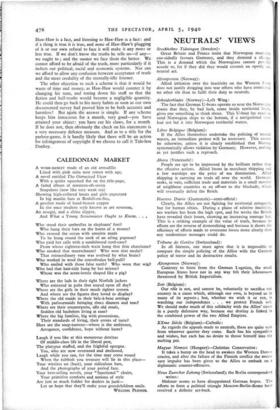NEUTRALS' VIEWS
Stockholms Tidningen (Sweden): Great Britain and France insist that Norwegian newt::; one-sidedly favours Germany, and they demand a This is a demand which the Norwegians cannot po accede to, for if they did they would commit an openly :71- neutral act.
Aftenposten (Norway): Allied irritation over the inactivity on the Western Font does not justify dragging into war others who have comm.: teli no other sin than to fulfil their duty as neutrals.
Arbeiderbladet (Norway)—Left Wing:
The fact that German U-boats operate so near the Norwi_i:ai, coasts that they, by bad luck, come inside territorial lin,:ts, gives one something to think about. This U-boat lay read, to send Norwegian ships to the bottom, if a navigational error had not led it into Norwegian territorial waters.
Libre Belgique (Belgium):
If the Allies themselves undertake the policing of neutral waters, an immediate protest will be necessary. This cannot be otherwise, unless it is clearly established that Norway systematically allows violation by Germany. However, nothing as yet justifies such a reproach.
Ahora (Venezuela): People are apt to be impressed by the brilliant rather than the effective actions. Allied losses in merchant shipping and a few warships are the price of sea domination. Allied shipping is carrying on trade all over the world. Germany seeks, in vain, sufficient trade and materials in a small number of neighbour countries as an off-set to the blockade, which will eventually defeat the Reich.
Nuestro Diario (Guatemala)--semi-official: Clearly, the Allies are not fighting for territorial conquests, but for human ethics. During a phase of relative inactivity, sea warfare has been the high spot, and for weeks the British have revealed their losses, showing an increasing tonnage lost. This is a striking example of the value of truth, because its effects are the reverse of demoralising and because it shows the efficiency of efforts made to overcome losses more clearly than any tendentious messages could do.
Tribune de Geneve (Switzerland): In all fairness, one must agree that it is impossible to compare the simple policing of the Allies with the German policy of terror and its destructive results.
Aftenposten (Norway): Contrary to hints from the German Legation, the small European States have not in any way felt their lebensraum threatened by British Imperialism.
Soir (Belgium): Our role is not, and cannot be, voluntarily to sacrifice our country in a cause which, although our own, is beyond us in many of its aspects ; but, whether we wish it or not, in watching our independence . . . we protect French soil. We should make much of this solidarity with the Allies' cause in a purely defensive way, because our destiny is linked in the combined power of the two Allied Empires.
XXme Siècle (Belgium)—Catholic:
As regards the appeals made to neutrals, these are quite vain from whatever quarter they come. Each has his sympathies and wishes, but each has no desire to throw himself into the melting pot.
Magyar Nemzet (Hungary)—Christian Conservative:
It takes a bump on the head to awaken the Western Demo- cracies, and after the failure of the Finnish conflict the neces- sary impulse has been given to the Allies to embark on a diplomatic counter-offensive.
Neue Zuercher Zeitung (Switzerland); the Berlin correspondent writes:
Molotov seems to have disappointed German hopes. The efforts to form a political triangle Moscow-Berlin-Rome have received a definite set-back.














































 Previous page
Previous page